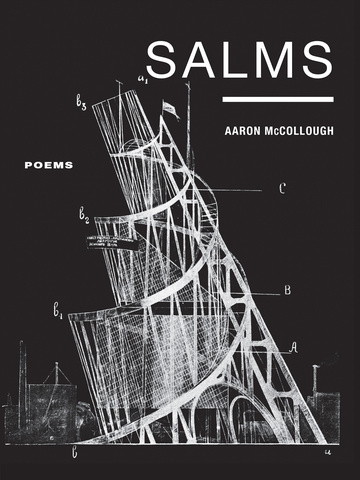
Each semester, the Writing University hosts the 5Q Interview series with authors from the University of Iowa Press. We sit down with UI Press authors to ask about their work, their process, their reading lists and events. Today we are speaking with Aaron McCollough, author of Salms (University of Iowa Press, 2024).
Aaron McCollough was raised in Tennessee. He currently works as Head of Partner Success at Ubiquity Press. He has over 10 years of experience in publishing, editorial, and professional writing fields. He is co-pubslisher, with Karla Kelsey, of SplitLevel Texts.
**
Can you tell us a little bit about your new book Salms?
Sure. This is my seventh book of poems, and the first one to come out in 9 years. The one before that was Rank, published in 2015, also with The University of Iowa Press. According to Rosmarie Waldrop, Edmond Jabès called the period between projects "the book of torment," and I found this resonant and mildly comforting in the first several years following Rank's completion. I put a great deal of effort into writing during that time, but I was miserable with the results and felt real identity loss — not the good kind of "ego death" promised by negative capability but rather a dread that I'd already said all I had to say, leaving my life evacuated of meaning. I kept writing anyway, sometimes testing things by sharing with friends, and then feeling immediately embarrassed and throwing almost everything out. At some point around 2018, I spontaneously started writing pieces that I trusted in a way I hadn't for a long time. These were more directly personal than most of my prior work, and while I had worked in "sentences" before, these felt formally almost like real prose. The intended audience, I realized, wasn't my friends or any imagined anonymous groups of poetry readers, it was God. These poems comprised a knot of praise and complaint with a clear (to me, at least) precedent: the song poems of the Hebrew Ketuvim, which arrived for me via Christianity and, particularly, the Psalter of the English Church. I say "precedent" because, finally, my book is also something different, salms, something new and old, the Psalter's vitiated descendent.
What was the inspiration for this work?
In graduate school, whenever I used the word "inspiration" to refer to the ambivalent mixture of internal and external provocation that I associated with getting things done, one of my favorite professors would invariably say "I don't believe in inspiration," as if I was literally referring to divine insufflation as the origin for my thoughts. I'm pretty sure your question comes from a place of greater comfort with the term's more metaphorical register, so I won't say God's noumen. I also won't say the Book of Psalms. Truly, the relationship there is less direct than the word inspiration (taken literally or figuratively) would suggest, and I think it's safe to say that, for me, inspiration always tends to be pretty eclectic. There are some relative constants, however, maybe the biggest one being George Herbert's The Temple, which is obsessed by the Book of Psalms, and which featured prominently in the same graduate work where inspiration's validity as a concept was initially (and consistently) questioned. A list of heavy influences pushing behind this particular book, whether still legible there or not, would include Benjamin's short book of essays, The Storyteller, Proust's In Search of Lost Time, Nietzsche's The Gay Science, Bergson's Creative Evolution and Matter and Memory, Ortega y Gasset's Some Lessons in Metaphysics, Merleu-Ponty's Phenomenology of Perception, Ricoeur's Oneself as Another, Cocteau's Orpheus, Rilke's Sonnets to Orpheus and Duino Elegies, and the poems of Friederike Mayröcker, Jean Follain, and Ingeborg Bachmann.
Do you have any plans for readings or events for this book, either in person or virtual?
I have a desire to give some readings and have had some initial conversations about setting them up, but nothing so far is concretely planned.
What are you reading right now? Any books from other university or independent presses?
At the moment, I'm reading death and then what? by Marc Oraison, Freud's Beyond the Pleasure Principle, Fanny Howe's Love and I (Graywolf), Donna Stonecipher's The Ruins of Nostalgia (Wesleyan University Press), and Jon Fosse's Septology.
What is your writing routine? Do you have a daily routine?
With respect to writing specifically, I seem to go through periods of routine and periods without routine. Funnily enough, these periods correspond to a sense of inspiration (or its lack). I do have a more general morning routine of waking very early for reading and contemplation before starting my work day, and this sometimes produces a fair amount of writing for stretches at a time. But then, sooner or later, these stretches end. Will another present itself? I try hoping so without expectation.
**
Thank you!